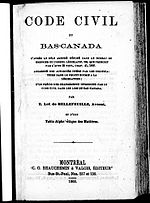Civil Code of Lower Canada
| Code civil du Bas-Canada | |
|---|---|

Cover page from an 1866 edition of the Code
|
|
| Legislative Assembly of the Province of Canada | |
| Citation | 29 Vict., ch. 41, (1865) |
| Territorial extent | Lower Canada (Quebec from 1 July 1867) |
| Date of Royal Assent | 18 September 1865 |
| Date commenced | 1 August 1866 |
| Date repealed | 1 January 1994 (provincial) 1 June 2001 (federal) |
The Civil Code of Lower Canada (French: Code civil du Bas-Canada) came into force in Lower Canada on 1 August 1866 and continued to be in effect in Quebec until its repeal and replacement by the Civil Code of Quebec on 1 January 1994. The Code was based on the Napoleonic code and replaced a mixture of French law and English law which had arisen in Lower Canada since the creation of the Province of Quebec in 1763.
From 1608 to 1664, the first colonists of New France followed the customary law (French: coutume) in effect for their province of origin in France. In 1664, the King of France decreed in Article 33 of the decree establishing the French West India Company (French: l'Édit d'établissement de la compagnie des Indes occidentales) that the Coutume de Paris would serve as the main source of law throughout New France. Later, authorities went on to add le droit français de la métropole, that is, French law. This included royal decrees and ordinances (ordonnances royales), canon law relating to marriages, and Roman law relating to obligations, e.g. contracts and torts. Also in force were the ordinances issued by Royal Intendants (ordonnances des intendants) and the orders and judgments handed down by the Conseil supérieur.
The Royal Intendant was responsible for administering justice in the colony, and lawyers were barred from practicing in the colony. Most disputes were resolved by local notaries or local parish priests through arbitration in a manner much as had been done in ancient Rome. While the reliance on feudal French law meant that New France was divided into fiefs (seigneuries), the feudal lords (or seigneurs) were not entitled to the same judicial discretion in New France as they had in France; as it was, all criminal jurisdiction went to the Intendant. Therefore, while the Custom of Paris was the law of New France, there were few resources available for colonists to actually enforce that law.
...
Wikipedia
